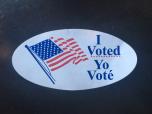Tuesday night, as mothers all across the country tucked young daughters into bed, many told them when they awoke our country would have elected its first woman president.
They were wrong.
On Wednesday, Hillary Clinton delivered a concession speech, saying: "And to all of the little girls who are watching this, never doubt that you are valuable and powerful and deserving of every chance and opportunity in the world to pursue and achieve your own dreams." She talked of her many successes and setbacks, charging her supporters "to never stop believing that fighting for what's right is worth it" and assuring them that "we need you to keep up these fights now and for the rest of your lives."
Thousands of voters had already paid homage to those who had come before and paved the way for Hillary, women who had fought long and hard more than a century ago to make it possible for women to vote and others who later worked to obtain equal rights. At Mt. Hope Cemetery in New York State, they had placed their "I voted" stickers on Susan B. Anthony's grave. It was Susan B. Anthony who, along with Elizabeth Cady Stanton, founded the National Woman's Suffrage Association. Born in Massachusetts in 1820, Susan had learned at an early age that she deserved equal rights. Her father took her out of school and taught her at home after learning she was not taught the same subjects as the boys.
So many others fought for women's right to vote—the Quaker abolitionist Lucretia Mott and Harriet Tubman, also an abolitionist, one of the most famous "conductors" on the underground railroad. There was Sojourner Truth, friend to both Lucretia Mott and Harriet Tubman. She too was born into slavery and became free. Like Lucretia Mott, she traveled thousands of miles as an itinerant preacher—speaking out against slavery and for women. Writer Frances Dana Parker Gage heard her speak at the Ohio Women's Rights Convention in 1851 and passed on her words, "If the first woman God ever made was strong enough to turn the world upside down all alone, these women together ought to be able to turn it back and get it right side up again."
As Hillary told us (on more than one occasion), it was Eleanor Roosevelt who was her muse. Eleanor who revolutionized the role of First Lady and later chaired the United Nations Human Rights Commission that drafted the Universal Declaration of Human Rights. A woman who had followed her own agenda for decades. When her husband Franklin was elected Governor of New York, Eleanor moved with him to Albany, but she also returned weekly to New York City from Sunday to Wednesday to teach American history, English, drama and current events at Todhunter School for Girls.
It is because of these women—Susan B. Anthony, Elizabeth Cady Stanton, Lucretia Mott, Harriet Tubman, Sojourner Truth, Eleanor Roosevelt and others—that Hillary Clinton became the first female nominee for president. On Wednesday, she left us with these words: "Now, I know we have still not shattered that highest and hardest glass ceiling, but someday someone will—and hopefully sooner than we might think right now."
[See: http://www.aljazeera.com/news/2016/11/election-voters-pay-tribute-susan-...
For a comprehensive timeline on voting rights in the United States, see http://interactive.aljazeera.com/aje/2016/us-elections-2016-who-can-vote.... This interactive shows not only the history of rights for male non-property holders, African Americans, and women, but also for Native Americans, Asians, residents of U.S. colonies and felons.]

